Sunday, January 22, 2006
Major Announcement From Carpetblogger
As of tomorrow, Carpetblogger will no longer be reporting from Azerbaijan, the Oasis Between Iran and Chechnya. It's been almost two years and the time has come to pull up stakes and mosey on down the golden road.
Here are some FAQ. Feel free to post others. I will feel free to ignore those I don't like.
*Where are you going?
For the short term, Ukraine. While I have mixed feelings about this -- it's Europe! -- it's going to be big fun and there will be a lot happening, specifically around the end of March. Tempramentally and professionally, it will be a better fit.
*Why are you leaving?
It wasn't 100% up to me. But that's a long story. What a long, strange trip it's been.
*What are the Producer and the Carpetdogs going to do?
The family is going remain in Baku. The Producer is building an empire, and, recent setbacks notwithstanding, sees no good reason to give it all up and follow his wife around the world. He's just glad we have different last names. Kiev's a short, cheap flight away on some of the world's finest airlines, and we've heard it has a great climate, so he'll be eager to visit.
*Are you bummed?
Not as much as I thought I'd be. The appeal of a place like Baku is less the city than the people you meet in it. Not many folks stay put -- at least among expats -- and most of my close friends have left in the last six months. There are a few people I'm sad to leave, but I'm also glad I don't have to be the one who stays put.
*There are no carpets in Ukraine. What ever will you do?
This is a huge problem.
*I feel gypped. Carpetblogger may be based in the Caucasus, but it's never been caustic. What gives?
I've been exceedingly careful to stay away from anything remotely sensitive, political or mock-worthy on this blog, which has been frustrating and completely out of character. If ever there was a ripe target for some caustic commentary, it's Azerbaijan. Especially in the last six months, there's been a lot written -- and not written -- that I have been dying to address. I often considered changing the tagline to "castrated commentary." But in my old age, I've become partial to paychecks and my job pays better than this blog. Besides, I might get kicked out. Oh, wait....
Are you going to continue Carpetblog?
Inshallah.
How are we going to keep up on the latest fashion and restaurant trends in Azerbaijan?
I don't know of anyone -- local or Azeri -- who is blogging in Azerbaijan on anything of substance. Someone should, especially an Azeri. Blogrel and One World Multimedia do a great job from Armenia and sometimes post on Azerbaijan. They, and Global Voices have been advocating for a more vibrant Caucasian blogosphere. I completely support the idea, especially in a place like Azerbaijan where opportunities for those with dissenting views to get their voices heard are limited. There aren't a lot of computer literate, English-speaking writers and an even smaller domestic audience, but that doesn't mean it's not worth doing.
*What are you going to miss about Baku?
Cheap DVDs; my local team; Samaya's varenekis; my loyal staff of committed taxi drivers; good Georgian food; the Pork Chop Shop (though I've heard the Ukrainians are wizards with the swine); Nesemi Bazaar; that anything broken can be fixed; Ruslan, carpetdealer to the stars; seeing live animals and people riding in the trunks of Zhigulis;
*What are you not going to miss?
Anyone who asks this question does not know me and does not live here. Azeri drivers.
*What do you regret about your time in Baku?
Not getting to Naxchivan or the South; Not going to the Boat Bar more often; Not buying more carpets;
*What advice do you have for someone moving to Baku?
Insist on seatbelts.
*What are your top 10 albums of all time?
Son Volt -- Trace; Van Morrison -- Astral Weeks; Matthew Sweet -- Altered Beast; Lucinda Williams -- Car Wheels on a Gravel Road; Uncle Tupelo -- March 19-21; Wilco -- Yankee Hotel Foxtrot; Roxy Music -- Avalon;
Here are some FAQ. Feel free to post others. I will feel free to ignore those I don't like.
*Where are you going?
For the short term, Ukraine. While I have mixed feelings about this -- it's Europe! -- it's going to be big fun and there will be a lot happening, specifically around the end of March. Tempramentally and professionally, it will be a better fit.
*Why are you leaving?
It wasn't 100% up to me. But that's a long story. What a long, strange trip it's been.
*What are the Producer and the Carpetdogs going to do?
The family is going remain in Baku. The Producer is building an empire, and, recent setbacks notwithstanding, sees no good reason to give it all up and follow his wife around the world. He's just glad we have different last names. Kiev's a short, cheap flight away on some of the world's finest airlines, and we've heard it has a great climate, so he'll be eager to visit.
*Are you bummed?
Not as much as I thought I'd be. The appeal of a place like Baku is less the city than the people you meet in it. Not many folks stay put -- at least among expats -- and most of my close friends have left in the last six months. There are a few people I'm sad to leave, but I'm also glad I don't have to be the one who stays put.
*There are no carpets in Ukraine. What ever will you do?
This is a huge problem.
*I feel gypped. Carpetblogger may be based in the Caucasus, but it's never been caustic. What gives?
I've been exceedingly careful to stay away from anything remotely sensitive, political or mock-worthy on this blog, which has been frustrating and completely out of character. If ever there was a ripe target for some caustic commentary, it's Azerbaijan. Especially in the last six months, there's been a lot written -- and not written -- that I have been dying to address. I often considered changing the tagline to "castrated commentary." But in my old age, I've become partial to paychecks and my job pays better than this blog. Besides, I might get kicked out. Oh, wait....
Are you going to continue Carpetblog?
Inshallah.
How are we going to keep up on the latest fashion and restaurant trends in Azerbaijan?
I don't know of anyone -- local or Azeri -- who is blogging in Azerbaijan on anything of substance. Someone should, especially an Azeri. Blogrel and One World Multimedia do a great job from Armenia and sometimes post on Azerbaijan. They, and Global Voices have been advocating for a more vibrant Caucasian blogosphere. I completely support the idea, especially in a place like Azerbaijan where opportunities for those with dissenting views to get their voices heard are limited. There aren't a lot of computer literate, English-speaking writers and an even smaller domestic audience, but that doesn't mean it's not worth doing.
*What are you going to miss about Baku?
Cheap DVDs; my local team; Samaya's varenekis; my loyal staff of committed taxi drivers; good Georgian food; the Pork Chop Shop (though I've heard the Ukrainians are wizards with the swine); Nesemi Bazaar; that anything broken can be fixed; Ruslan, carpetdealer to the stars; seeing live animals and people riding in the trunks of Zhigulis;
*What are you not going to miss?
Anyone who asks this question does not know me and does not live here. Azeri drivers.
*What do you regret about your time in Baku?
Not getting to Naxchivan or the South; Not going to the Boat Bar more often; Not buying more carpets;
*What advice do you have for someone moving to Baku?
Insist on seatbelts.
*What are your top 10 albums of all time?
Son Volt -- Trace; Van Morrison -- Astral Weeks; Matthew Sweet -- Altered Beast; Lucinda Williams -- Car Wheels on a Gravel Road; Uncle Tupelo -- March 19-21; Wilco -- Yankee Hotel Foxtrot; Roxy Music -- Avalon;
Friday, January 20, 2006
Black January
Today -- 20 January -- is the mother of all Mourning Days (don't you even think about calling it a holiday) in Azerbaijan. It commemorates the day 16 years ago when Soviet tanks rolled into Baku to crush the fledgling independence movement.
From a breathless email that circulated around town yesterday:
The day was a pivotal event in modern history and Azeris are dead serious about remembering the martyrs. The black clad crowd (the color choice has nothing to do with mourning -- most Azeris wear only black), starts flowing along Martyrs Lane early in the morning. They stream in silence past the black granite grave markers, gently laying red carnations in meticulous piles. Mourners are mostly men, with a few women and children. Only a few people talked on their cell phones in the procession. This is covered non-stop by all the television stations.
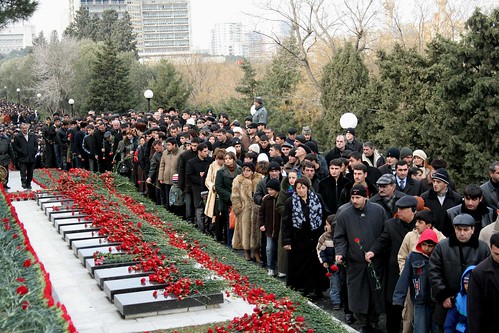
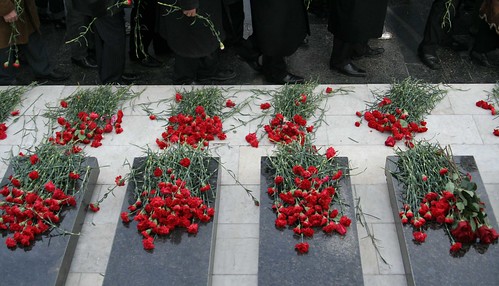
So compelling were the TV shots, I thought I'd go check it out for myself. Surprisingly, it was more interesting in person.
According to Azerbaijan Diary, a first-hand account of Azerbaijan in the early '90s, Martyr's Lane used to be a muddy hillside with makeshift graves from the Martyrs of 20 Janvar. Since the Nagorno Karabagh conflict, it has been transformed into a national shrine, a place to remember national martyrs from NK as well. It is by far the nicest, cleanest, most scenic park in Baku, with panoramic views of the sea, the shipyards, the oil decaying derricks and derelict housing around Baku's edges.
Most of the granite headstones feature a photo of the grave's occupant and brief details of their short lives. 20 Janvar matyrs were of all ages. Most NK victims were young enlisted men, who died in their late teens or early 20's. Most are still lovingly polished. A number of families brought Imans to say graveside prayers.
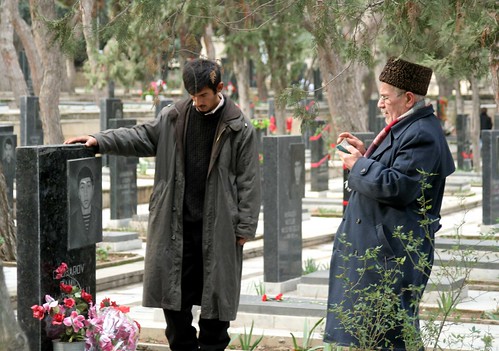
Everyone is more than happy to tell you where they were on that day. My staff -- even though most of them were only in their early teens in 1990 -- remembered where they were, and what role -- no matter how peripheral-- they played in the event, in detail. Interestingly -- though not terribly surprising -- the number of mourners who visit Martyrs Lane on 20 Janvar has diminished with the passing of time, according to a friend. He says millions of people would visit the shrine in the early '90s. Furthermore, he reports the government is making less effort to organize trips for teachers, doctors and other state employees than in years past. He attributes this to the desire for this national day of mourning not to upstage another national day of mourning that is more important politically in the current environment -- the anniversary of the death of dictator Heydar Aliyev.
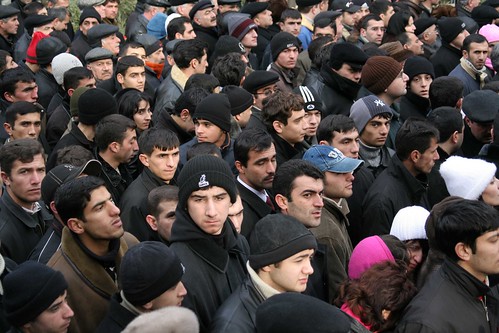
From the same email:
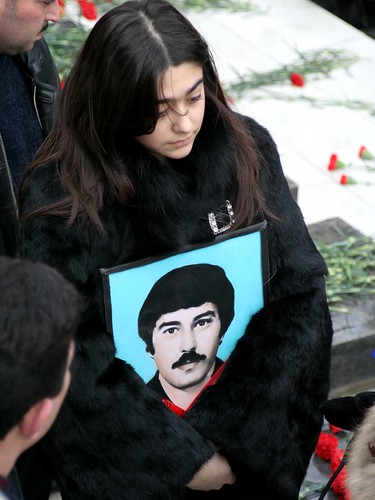
From a breathless email that circulated around town yesterday:
Special Soviet troops using heavy offensive weapons, including tanks and armored vehicles, occupied the city. As a result of punitive actions, more than 130 civilians were killed and 700 wounded, hundreds of people were arrested and subjected to various forms of physical pressure. Among victims were a 7-year old boy, a 16-year old girl, an 80-year old man, a young doctor shot in ambulance while helping another victim, and many other civilians of different nationalities of Baku. This massacre entered the history of Azerbaijan as the "Black January."
The day was a pivotal event in modern history and Azeris are dead serious about remembering the martyrs. The black clad crowd (the color choice has nothing to do with mourning -- most Azeris wear only black), starts flowing along Martyrs Lane early in the morning. They stream in silence past the black granite grave markers, gently laying red carnations in meticulous piles. Mourners are mostly men, with a few women and children. Only a few people talked on their cell phones in the procession. This is covered non-stop by all the television stations.


So compelling were the TV shots, I thought I'd go check it out for myself. Surprisingly, it was more interesting in person.
According to Azerbaijan Diary, a first-hand account of Azerbaijan in the early '90s, Martyr's Lane used to be a muddy hillside with makeshift graves from the Martyrs of 20 Janvar. Since the Nagorno Karabagh conflict, it has been transformed into a national shrine, a place to remember national martyrs from NK as well. It is by far the nicest, cleanest, most scenic park in Baku, with panoramic views of the sea, the shipyards, the oil decaying derricks and derelict housing around Baku's edges.
Most of the granite headstones feature a photo of the grave's occupant and brief details of their short lives. 20 Janvar matyrs were of all ages. Most NK victims were young enlisted men, who died in their late teens or early 20's. Most are still lovingly polished. A number of families brought Imans to say graveside prayers.

Everyone is more than happy to tell you where they were on that day. My staff -- even though most of them were only in their early teens in 1990 -- remembered where they were, and what role -- no matter how peripheral-- they played in the event, in detail. Interestingly -- though not terribly surprising -- the number of mourners who visit Martyrs Lane on 20 Janvar has diminished with the passing of time, according to a friend. He says millions of people would visit the shrine in the early '90s. Furthermore, he reports the government is making less effort to organize trips for teachers, doctors and other state employees than in years past. He attributes this to the desire for this national day of mourning not to upstage another national day of mourning that is more important politically in the current environment -- the anniversary of the death of dictator Heydar Aliyev.

From the same email:
The invasion was launched at the midnight and committed with ferocity and no mercy for children, women and elderly. Helsinki Human Rights Watch has documented how the Soviet army intentionally ran down and crashed unarmed peaceful civilians under their tanks. How they opened fire at a civilian bus that posed no conceivable physical threat, killing the driver and many passengers. How they attacked hospitals and clearly marked ambulances and medical personnel assisting the wounded. How they randomly sprayed residential yards and apartment buildings with automatic fire. Finally, how they stabbed defenseless civilians to death with bayonets. The Wall Street Journal editorial of January 4, 1995, stated: "It was Mr. Gorbachev, recall, who in January 1990 chose to defend his use of violence against the independence-seeking Azerbaijan on the grounds that the people of this then-Soviet republic were "heavily armed gangs of hooligans and drug-traffickers who were destabilizing the country and quite possibly receiving support from foreign governments."

Wednesday, January 18, 2006
Bald Tire Nation
The only thing that could conceivably make Baku's streets more treacherous is the addition of snow and ice. Today was the first snow of the season and it's still coming down. Idiot drivers, unplowed streets and poorly maintained cars mean that it's safer just to stay home.
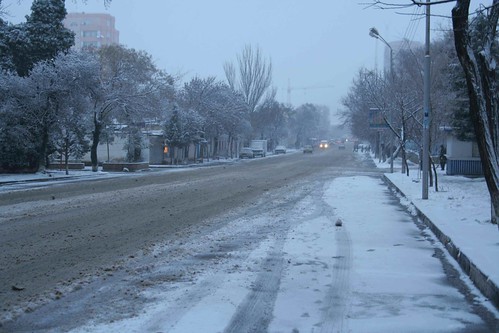
However, home is not the cozy haven one would hope. As long as I'm airing some grievances, at this moment, we have heat only in the rooms we don't use (not enough electricity comes into the house to run the heat or the microwave or the pump) and absolutely not one drop of water.
I guess it's best just to walk to the bar.

However, home is not the cozy haven one would hope. As long as I'm airing some grievances, at this moment, we have heat only in the rooms we don't use (not enough electricity comes into the house to run the heat or the microwave or the pump) and absolutely not one drop of water.
I guess it's best just to walk to the bar.
Saturday, January 14, 2006
Birds Mysteriously Die and Sale of Poultry Banned? Why Could That Be?
Turan reports today that the sale of poultry in Azerbaijan is banned as of this weekend, which explains why it was impossible to find any chicken in the markets today.
And, oh yeah, remember all those chickens that mysteriously died in Masalli a few weeks ago? OF COURSE they didn't have bird flu -- they were probably just crossing a road or something -- but, just to be safe, they're going to be retested outside of Azerbaijan.
I wonder how this story is going to turn out?
And, oh yeah, remember all those chickens that mysteriously died in Masalli a few weeks ago? OF COURSE they didn't have bird flu -- they were probably just crossing a road or something -- but, just to be safe, they're going to be retested outside of Azerbaijan.
I wonder how this story is going to turn out?
Friday, January 13, 2006
Iki YAM!
Azerbaijan has a new currency, delightfully shorthanded as YAM (Yeni Azerbaijan Manat, or new Azerbaijan Manat). It's causing all manner of mayhem.
You never know what currency is going to come out of the ATM -- old Manats or new. The standard foreigner taxi fare of one shirvan, (or 10,000 old manats, now two, or iki, YAM)is now subject to far too much debate and interpretation. It's certainly more fun to argue with taxi drivers over YAMs than Shirvans or Mahmeds. In addition, it's not at all inappropriate to pay for some things in dollars, thus creating three acceptable forms of legal tender in Azerbaijan. Toss in the fact that educational standards have slid somewhat since the Soviets bailed out and things can get sitcom wacky.
The new YAMS look like Euros. In fact, some bills have the most broadly interpreted map of Europe on them I've ever seen. It practically includes Kazakhstan.
You never know what currency is going to come out of the ATM -- old Manats or new. The standard foreigner taxi fare of one shirvan, (or 10,000 old manats, now two, or iki, YAM)is now subject to far too much debate and interpretation. It's certainly more fun to argue with taxi drivers over YAMs than Shirvans or Mahmeds. In addition, it's not at all inappropriate to pay for some things in dollars, thus creating three acceptable forms of legal tender in Azerbaijan. Toss in the fact that educational standards have slid somewhat since the Soviets bailed out and things can get sitcom wacky.
The new YAMS look like Euros. In fact, some bills have the most broadly interpreted map of Europe on them I've ever seen. It practically includes Kazakhstan.
Is the Producer Cursed? Discuss
Who else's office would burn down two days after he moves into it?
Big fire in an office building in Baku Tuesday night. It started in the local Eriksson offices and pretty much stayed there, but The Producer's brand new set of four offices, sublet from an American NGO, were right next to it and supplied the walls through which firefighters could break to fight it. They'd only actually moved into one of the offices-- the very one that now has a charred, collapsed roof and is ankle deep in water.
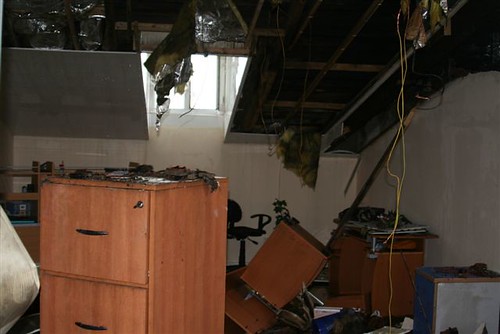
Fortunately, they hadn't yet moved the pricey new editing suite in. Also, the brand new high-end camera they just purchased seems only to be a little wet. That's about all that can be said that's good.
No insurance. Hadn't yet signed up. A couple of computers ruined. Police and/or firefighters STOLE two of the other cameras. It is the case, however, that one of them is unique in Baku, so if it turns up in someone's grimy little paws, the fur is going to fly.
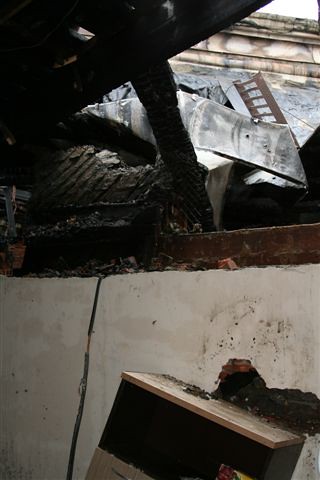
More than one person expressed surprise that Baku does have a firefighting brigade. They seemed to be reasonably well equipped (by that I mean the engines weren't pulled by horses and there were hoses that reached the 5th floor).
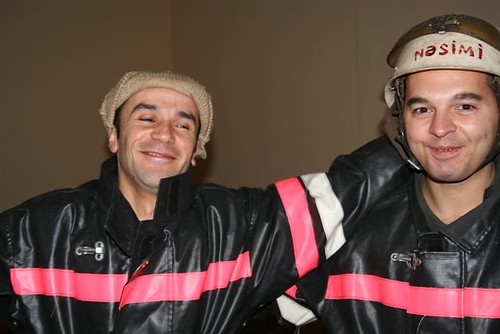
Everyone in Baku knows the Producer, from the freak frisbee accident, to the Russia mugging to the fire.
Big fire in an office building in Baku Tuesday night. It started in the local Eriksson offices and pretty much stayed there, but The Producer's brand new set of four offices, sublet from an American NGO, were right next to it and supplied the walls through which firefighters could break to fight it. They'd only actually moved into one of the offices-- the very one that now has a charred, collapsed roof and is ankle deep in water.

Fortunately, they hadn't yet moved the pricey new editing suite in. Also, the brand new high-end camera they just purchased seems only to be a little wet. That's about all that can be said that's good.
No insurance. Hadn't yet signed up. A couple of computers ruined. Police and/or firefighters STOLE two of the other cameras. It is the case, however, that one of them is unique in Baku, so if it turns up in someone's grimy little paws, the fur is going to fly.

More than one person expressed surprise that Baku does have a firefighting brigade. They seemed to be reasonably well equipped (by that I mean the engines weren't pulled by horses and there were hoses that reached the 5th floor).

Everyone in Baku knows the Producer, from the freak frisbee accident, to the Russia mugging to the fire.
Monday, January 09, 2006
Do You Like Carpetblogger, Punk?
Then might we suggest The Bloggies?
Blood of the Lamb Flows Tomorrow
Boy oh boy, colorful holidays like tomorrow's Bayram (Eid Al-Adha) are why we live in places like this, right? It is not a good day to be a sheep, though, since every family is obligated to slaughter one and distribute the meat among their members and the poor. It's rooted in when Abraham offered to sacrifice his son Ishamel to Allah (also known as "Yaweh" or good ol' "God" in other religions).
Allah responded by giving him two sheep. As a known hater of sheep, I say Abraham got screwed.
From the 13th floor of my modern, high rise office building, I could see flocks of sheep lined up along the roadsides. By dark, they had pushed head first in wet, dirty wooly masses up against building walls, backs to the wind and snow, like the condemned prisoners they are. The Producer mused on whether it was better to be the first sheep or the last sheep. Since I believe the only good sheep is a dead sheep, I didn't weigh in.
Last year, I posted about the piles of sheep pelts , the blood in the streets and the unusually colorful TV commercials.
Allah responded by giving him two sheep. As a known hater of sheep, I say Abraham got screwed.
From the 13th floor of my modern, high rise office building, I could see flocks of sheep lined up along the roadsides. By dark, they had pushed head first in wet, dirty wooly masses up against building walls, backs to the wind and snow, like the condemned prisoners they are. The Producer mused on whether it was better to be the first sheep or the last sheep. Since I believe the only good sheep is a dead sheep, I didn't weigh in.
Last year, I posted about the piles of sheep pelts , the blood in the streets and the unusually colorful TV commercials.
Travel Tips
From World hum comes this clever list of travel hints from students who did a Semester at Sea program. I think there are some excellent ideas in here.
During our round-the-world journey in 2003, the Producer and I came up with some similar tips, though we entered some uncharted territory in our list. From an email we sent home from South Africa in the last two weeks of our 13 month trip:
*You can have a lot of fun once you stop worrying about getting sick, robbed, hurt, lost or dirty.
*All soap products -- including bar, shampoo and laundry detergent -- are interchangeable. Toothpaste does not fall into this category.
*Don't ever bother to learn the word for "why?" in the local language. In the unlikely event that you understand the words in the answer, you will still never, ever understand the logic, especially in the former Soviet Union.
*Act like the rest of the world and eat for nourishment, not for pleasure. Lower your expectations and you'll never be disappointed.
*Honey is the least transportable of all condiments.
*There are two types of hotels: those with cockroaches you can see and those with cockroaches you cannot see. The key to peaceful co-existence is boundaries. Accept cockroach activity on walls, but react with violence once it moves to the floor, or near the bed.
*If you see no local chickens, don't eat chicken, or eggs. Same goes for pigs and pork products.
*Never board a vehicle for long distance, remote travel that cannot be repaired with a hammer, strips of inner tube and sand. This includes about everything built after 1985.
*A pair of socks, even underwear, can be worn more than once.
*Never write your real occupation on a visa application. That said, sullen passport control officers do not appreciate whimsical answers such as "pet psychic" or "shepherd."
*When in Ethiopia, clear your plate. Every time.
*Abandon all preconceptions about the structure and content of toilet facilities.
*Ciproflaxin cures everything. Corollary: Self-medication is not that hard.
*Swimming or showering in your clothes counts as washing them. In some countries, so does walking in the rain.
*Outside of western countries, human life has very little value, mostly due to oversupply. This philosophy is reflected in the driving habits of bus and taxi drivers. Accept --nay, embrace -- the risk.
*Always sample the local intoxicant.
*Dogs can be racist.
*When a riverside street vendor offers you a bowl of tasty-looking noodles, shut off peripheral thought. Think, "my, those noodles look tasty. I think I'll have some." Do not think, "where does she wash her dishes?"
*Before boarding any form of public transport, double and triple check its destination with at least one woman. If no woman is available, ask a small child. If no small child is available, ask any sentient being, including sheep, before relying on a male.
*If if feels like there's an insect in your pants or shirt, there probably is. React accordingly.
*Travelers checks are a costly anachronism. In any country where they're cheap and convenient to cash, there's an ATM on every corner. Any national bank that cannot create a system of functioning ATMs will not cash a travellers check without an enormous, time-consuming fuss that may result in someone being physically removed from the bank. Leave home without them.
*Never make decisions about onward travel after bus rides in excess of 12 hours.
*When on foot or bicycle in Africa, even giraffes are scary.
During our round-the-world journey in 2003, the Producer and I came up with some similar tips, though we entered some uncharted territory in our list. From an email we sent home from South Africa in the last two weeks of our 13 month trip:
*You can have a lot of fun once you stop worrying about getting sick, robbed, hurt, lost or dirty.
*All soap products -- including bar, shampoo and laundry detergent -- are interchangeable. Toothpaste does not fall into this category.
*Don't ever bother to learn the word for "why?" in the local language. In the unlikely event that you understand the words in the answer, you will still never, ever understand the logic, especially in the former Soviet Union.
*Act like the rest of the world and eat for nourishment, not for pleasure. Lower your expectations and you'll never be disappointed.
*Honey is the least transportable of all condiments.
*There are two types of hotels: those with cockroaches you can see and those with cockroaches you cannot see. The key to peaceful co-existence is boundaries. Accept cockroach activity on walls, but react with violence once it moves to the floor, or near the bed.
*If you see no local chickens, don't eat chicken, or eggs. Same goes for pigs and pork products.
*Never board a vehicle for long distance, remote travel that cannot be repaired with a hammer, strips of inner tube and sand. This includes about everything built after 1985.
*A pair of socks, even underwear, can be worn more than once.
*Never write your real occupation on a visa application. That said, sullen passport control officers do not appreciate whimsical answers such as "pet psychic" or "shepherd."
*When in Ethiopia, clear your plate. Every time.
*Abandon all preconceptions about the structure and content of toilet facilities.
*Ciproflaxin cures everything. Corollary: Self-medication is not that hard.
*Swimming or showering in your clothes counts as washing them. In some countries, so does walking in the rain.
*Outside of western countries, human life has very little value, mostly due to oversupply. This philosophy is reflected in the driving habits of bus and taxi drivers. Accept --nay, embrace -- the risk.
*Always sample the local intoxicant.
*Dogs can be racist.
*When a riverside street vendor offers you a bowl of tasty-looking noodles, shut off peripheral thought. Think, "my, those noodles look tasty. I think I'll have some." Do not think, "where does she wash her dishes?"
*Before boarding any form of public transport, double and triple check its destination with at least one woman. If no woman is available, ask a small child. If no small child is available, ask any sentient being, including sheep, before relying on a male.
*If if feels like there's an insect in your pants or shirt, there probably is. React accordingly.
*Travelers checks are a costly anachronism. In any country where they're cheap and convenient to cash, there's an ATM on every corner. Any national bank that cannot create a system of functioning ATMs will not cash a travellers check without an enormous, time-consuming fuss that may result in someone being physically removed from the bank. Leave home without them.
*Never make decisions about onward travel after bus rides in excess of 12 hours.
*When on foot or bicycle in Africa, even giraffes are scary.
Friday, January 06, 2006
More Things to Love About Istanbul
The Way Turks React When you Tell Them You Live in Azerbaijan: Even though they're fundamentally the same stock and speak similar languages, Turks view Azeris as their country bumpkin cousins who speak cracker Turkish -- hardly heirs to the same cultural heritage that brought us Turkish Delight (fruit flavored Silly Putty). I told a shopkeeper today I live in Azerbaijan, and he nearly doubled over laughing. "Why?" he asked incredulously. Good question.
Hammams: For the amount of time I've spent in the Muslim world, it's quite surprising that I'd never visited a hammam, or traditional bath house, before. I remember standing outside a hammam in Bukhara with a friend, soap and shampoo in hand, hemming and hawing about going in. At the last moment, we backed out, claiming it was getting late, or it was too expensive or some equally lame excuse.
There's just something -- a couple of things, actually -- that's offputting about the whole thing. Participating in such a fundamentally foreign ritual (public bathing), naked, when you don't speak the language has always seemed to me to be rife with potential pitfalls. What if, for example, I think I am asking for something benign, like extra soap, but am really asking for the super anal cleanse? What if I commit some faux pas and everyone starts yelling at me? That can be disorienting enough in, say, a bazaar. Add nudity and you've gonna have more than one set of red cheeks to cope with.
That's why Istanbul is a great place for hammam virgins. There are lots of hammams that are used to foreigners here, so everything is spelled out pretty clearly for you. Thus the potential for humiliation is fairly limited. It's also easier if you go with someone who's done it before, and just take the self-service wash. That way you can observe the procedure from a safe distance and pick up on others' behavioral cues.
Hammams are still very common in this part of the world, even though most people have indoor plumbing now and don't have to get their weekly bath at the hammam. Some Istanbul hammams -- like Cemberlitas, the one I visited -- are hundreds of years old and quite grand. Others are just glorified locker/steam rooms.
It's very social. Women sit around for hours chatting in the steam. Some hammams have separate rooms for men and women; others have special hours for men and special times for women. This is Islam, you know. No mixed gender bathing.
The bathing room sits beneath a vented dome. It's octagonally shaped, with white marble floors and a heated marble platform in the center to lie on and and work up a good sweat, just like in a steamroom. There's nothing nicer on a cold, damp day or for sore, tight muscles. Hot and cold spigots line the edges, with marble bowls that collect the water. Older hammams have complicated heating systems that rely on wood or coal to make the steam and heat the floors. Silver and copper buckets are there for you to use to splash and rinse with.
You can totally leave your hammam experience at that. No one would blame you. But you're missing out if you don't get the scrub. It's just like getting a massage, only the massuese is practically naked and believes true cleanliness can only be achieved by the removal of three layers of skin.
I'm not sure what chain of life events results in a woman opting to become a scrubber in a hammam as her vocation, but one of the requirements certainly has to be pendulous breasts and arms like pistons. She takes a little loofah washcloth and swatches and scrapes every inch of your exposed skin until ropes and balls of dead skin slide off your body. She knows just enough English to position you for maximum efficiency on the marble slab and simply slaps your ass when she wants you to flip over. The skin loss is gross, for sure (where does all that skin go?), but you feel so dewy and youthful when you're done, like you've lost 10 pounds in dead skin alone.
You can spend all day in the hammam, if you want, but your hands and feet start pruning up after a couple of hours or so. Grab a big fluffy Turkish towel and head back to the locker room -- just like at the gym -- to get dressed and head out on your way, clean, relaxed and fully exfoliated.
If you ever fly to Baku (and you know you all want to) via Turkish Airlines and have to suffer through that hideous all-day layover, I strongly recommend grabbing a taxi and taking the 20 minute ride into town for a visit to the hammam. Nothing will rid your body of jet skank and help prepare you more to deal with Baku than a scrub and soak.
Hammams: For the amount of time I've spent in the Muslim world, it's quite surprising that I'd never visited a hammam, or traditional bath house, before. I remember standing outside a hammam in Bukhara with a friend, soap and shampoo in hand, hemming and hawing about going in. At the last moment, we backed out, claiming it was getting late, or it was too expensive or some equally lame excuse.
There's just something -- a couple of things, actually -- that's offputting about the whole thing. Participating in such a fundamentally foreign ritual (public bathing), naked, when you don't speak the language has always seemed to me to be rife with potential pitfalls. What if, for example, I think I am asking for something benign, like extra soap, but am really asking for the super anal cleanse? What if I commit some faux pas and everyone starts yelling at me? That can be disorienting enough in, say, a bazaar. Add nudity and you've gonna have more than one set of red cheeks to cope with.
That's why Istanbul is a great place for hammam virgins. There are lots of hammams that are used to foreigners here, so everything is spelled out pretty clearly for you. Thus the potential for humiliation is fairly limited. It's also easier if you go with someone who's done it before, and just take the self-service wash. That way you can observe the procedure from a safe distance and pick up on others' behavioral cues.
Hammams are still very common in this part of the world, even though most people have indoor plumbing now and don't have to get their weekly bath at the hammam. Some Istanbul hammams -- like Cemberlitas, the one I visited -- are hundreds of years old and quite grand. Others are just glorified locker/steam rooms.
It's very social. Women sit around for hours chatting in the steam. Some hammams have separate rooms for men and women; others have special hours for men and special times for women. This is Islam, you know. No mixed gender bathing.
The bathing room sits beneath a vented dome. It's octagonally shaped, with white marble floors and a heated marble platform in the center to lie on and and work up a good sweat, just like in a steamroom. There's nothing nicer on a cold, damp day or for sore, tight muscles. Hot and cold spigots line the edges, with marble bowls that collect the water. Older hammams have complicated heating systems that rely on wood or coal to make the steam and heat the floors. Silver and copper buckets are there for you to use to splash and rinse with.
You can totally leave your hammam experience at that. No one would blame you. But you're missing out if you don't get the scrub. It's just like getting a massage, only the massuese is practically naked and believes true cleanliness can only be achieved by the removal of three layers of skin.
I'm not sure what chain of life events results in a woman opting to become a scrubber in a hammam as her vocation, but one of the requirements certainly has to be pendulous breasts and arms like pistons. She takes a little loofah washcloth and swatches and scrapes every inch of your exposed skin until ropes and balls of dead skin slide off your body. She knows just enough English to position you for maximum efficiency on the marble slab and simply slaps your ass when she wants you to flip over. The skin loss is gross, for sure (where does all that skin go?), but you feel so dewy and youthful when you're done, like you've lost 10 pounds in dead skin alone.
You can spend all day in the hammam, if you want, but your hands and feet start pruning up after a couple of hours or so. Grab a big fluffy Turkish towel and head back to the locker room -- just like at the gym -- to get dressed and head out on your way, clean, relaxed and fully exfoliated.
If you ever fly to Baku (and you know you all want to) via Turkish Airlines and have to suffer through that hideous all-day layover, I strongly recommend grabbing a taxi and taking the 20 minute ride into town for a visit to the hammam. Nothing will rid your body of jet skank and help prepare you more to deal with Baku than a scrub and soak.
Thursday, January 05, 2006
Egg Ladies
Thanks again to Gadling for selecting another one of my photos as photo of the day. I took a series of photos in the bazaar in Sheki -- one of my favorite bazaars in country -- when we were there in November. Sheki lies at the foot of the Caucasus and is made up of old stone buildings with characteristic red slate roofs. It is, without question, the loveliest town in Azerbaijan.
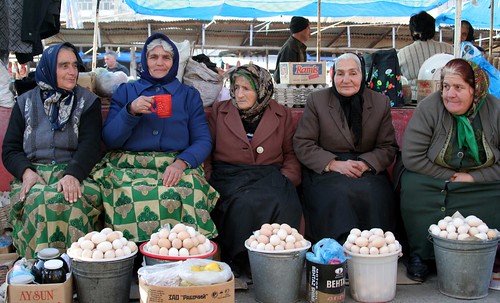
Gadling's commentary suggests that these ladies don't look all that thrilled to have their photo taken. Actually, the opposite was true. It's very atypical for people in some parts of the former Soviet Union to smile when they have their photos taken. They tend to put on their stoniest faces when the camera comes out. Even at happy events, like weddings, subjects tend to look positively funereal when they're asked to pose. In fact, most of the vendors in the Sheki Bazaar were eager to pose with their goods. They'd stand proud and stoic next to their cabbage or pomegranate until the shutter clicked, then went back to smiles. The digital camera added to the excitement by providing instant gratification.
Now, if someone were to suggest that some of those ladies seem not to be all that ladylike, I might have to agree. I've wondered that myself.
Wool Ladies
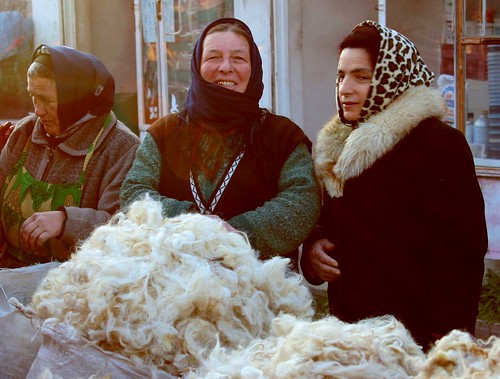
Nuts and Berries
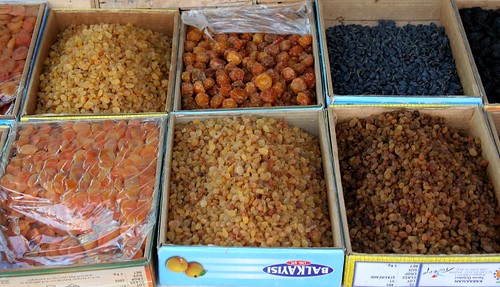
Cabbage Volga
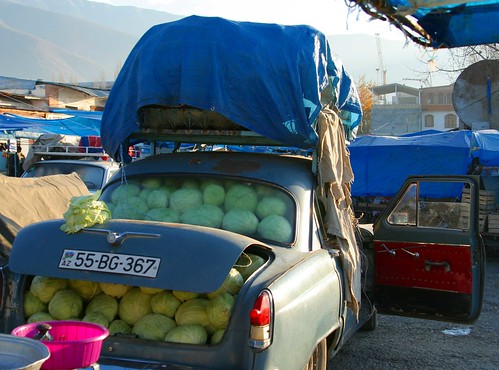
Meat Market Twins: goat meat maybe? Calf? Hard to say.
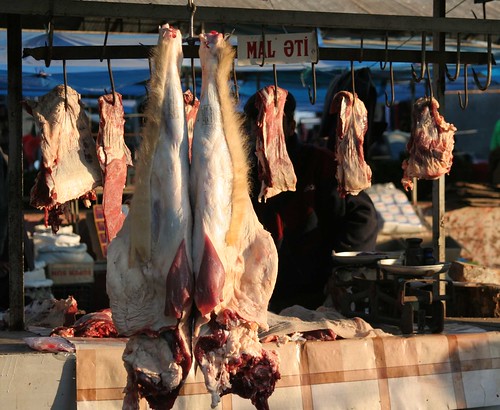

Gadling's commentary suggests that these ladies don't look all that thrilled to have their photo taken. Actually, the opposite was true. It's very atypical for people in some parts of the former Soviet Union to smile when they have their photos taken. They tend to put on their stoniest faces when the camera comes out. Even at happy events, like weddings, subjects tend to look positively funereal when they're asked to pose. In fact, most of the vendors in the Sheki Bazaar were eager to pose with their goods. They'd stand proud and stoic next to their cabbage or pomegranate until the shutter clicked, then went back to smiles. The digital camera added to the excitement by providing instant gratification.
Now, if someone were to suggest that some of those ladies seem not to be all that ladylike, I might have to agree. I've wondered that myself.
Wool Ladies

Nuts and Berries

Cabbage Volga

Meat Market Twins: goat meat maybe? Calf? Hard to say.

Not Constantinople
How do I love thee, Istanbul? Let me count the ways:
Shopping: The Producer and I started coming here in 1992, when it was a little rougher around the edges. Of course, I hadn't been to India or Cairo then, so I didn't know what aggressive touts were, but the carpet dealers in those days had to be beaten off with sticks. Now they greet you pleasantly and accept "No" as your final answer. Anyway, we've stocked up already on carpets (in fact, I bought my first carpets in Turkey), tiles, evil eyes, ceramics and all the other crap on offer. The Grand Bazaar doesn't appeal to me so much anymore. Besides, most of the carpets sold here now are garbage from Iran.
Now, I love Istanbul for its malls. Silvery, bright-white, multi-level malls with shops that sell things I want to buy. I took the subway out to two different malls and I never even saw the what their surrounding neighborhoods look like. They could have been among high-rises or slums. I didn't need the distraction, so I didn't bother to look. The atmosphere was like every other mall you've ever been in, with Starbucks and the food court and hundreds of shoe stores. You don't appreciate a decent mall until you need a winter coat unadorned by rhinestones or dog fur.
Quiet: Turks don't use their horns to communicate their animal urges while behind the wheel. The Producer and I stood beside a busy road in the central city and marveled at how quiet it was. We even got sloppy in crossing the streets, since drivers appear to mostly submit to the authority of traffic lights. I attribute part of this to the fact that a greater proportion of drivers are women. Women sometimes even sit in the front seat and in no way appear to be whores. Women smoke too, with no obvious shame brought to their families, either.
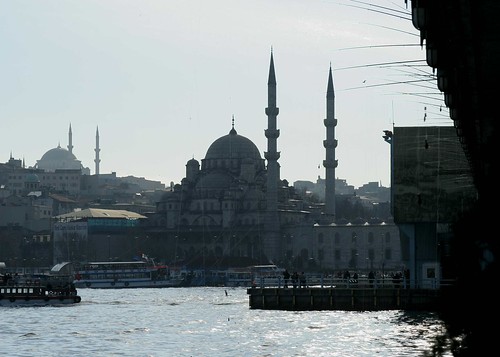
Aya Sofia: No matter how many times I go in it, the Aya Sofia never fails to take my breath away. It's always spider webbed with some manner of scaffolding, but even this doesn't detract much from the interior of one of the world's great buildings.
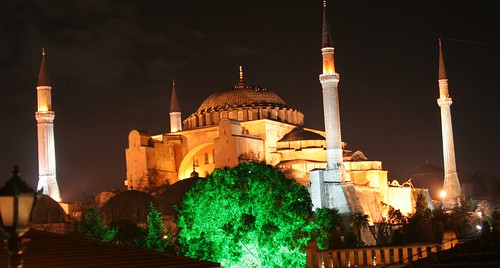
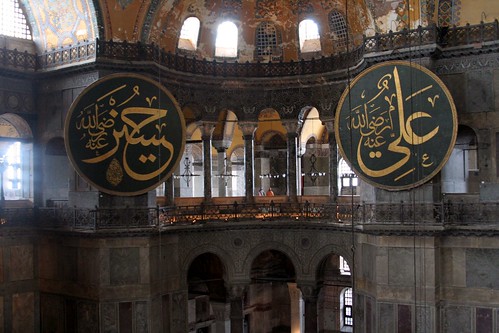
Fish: Whether it's a 2TL Balik-Ekmek under the Galata Bridge or a full meal at the Fish Bazaar, you can enjoy fish that doesn't set off metal detectors or taste like petroleum.
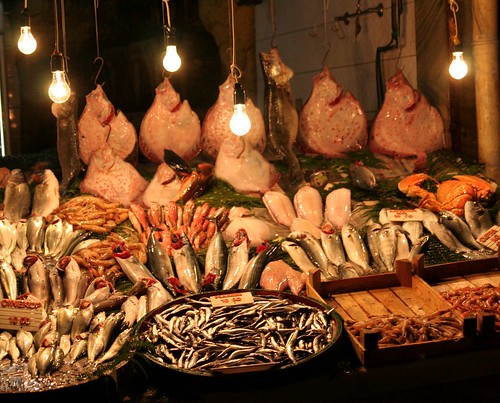
Istikal Caddesi: This kilometer-long pedestrian street is the cultural heart of modern Istanbul. All manner of people cruise up and down (by "all manner" I mean "people with more than two Lira to rub together,") shopping, eating, drinking, listening to live music, looking at art galleries, browsing bookstores (they have these here!!), drinking coffee and people watching. New Years Eve here was a madhouse, with throngs of thousands of all ages. It's especially gratifying to see men and women interacting normally, to see groups of women in bars (who are not, obviously, whores) and see women sitting alone in cafes, reading books or drinking coffee.
Istanbul rocks.
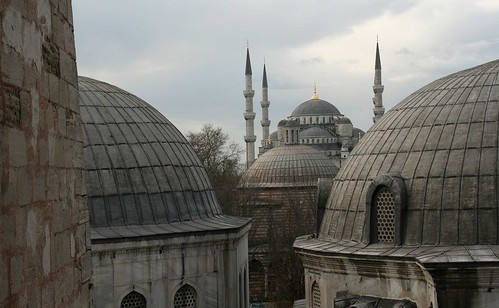
Shopping: The Producer and I started coming here in 1992, when it was a little rougher around the edges. Of course, I hadn't been to India or Cairo then, so I didn't know what aggressive touts were, but the carpet dealers in those days had to be beaten off with sticks. Now they greet you pleasantly and accept "No" as your final answer. Anyway, we've stocked up already on carpets (in fact, I bought my first carpets in Turkey), tiles, evil eyes, ceramics and all the other crap on offer. The Grand Bazaar doesn't appeal to me so much anymore. Besides, most of the carpets sold here now are garbage from Iran.
Now, I love Istanbul for its malls. Silvery, bright-white, multi-level malls with shops that sell things I want to buy. I took the subway out to two different malls and I never even saw the what their surrounding neighborhoods look like. They could have been among high-rises or slums. I didn't need the distraction, so I didn't bother to look. The atmosphere was like every other mall you've ever been in, with Starbucks and the food court and hundreds of shoe stores. You don't appreciate a decent mall until you need a winter coat unadorned by rhinestones or dog fur.
Quiet: Turks don't use their horns to communicate their animal urges while behind the wheel. The Producer and I stood beside a busy road in the central city and marveled at how quiet it was. We even got sloppy in crossing the streets, since drivers appear to mostly submit to the authority of traffic lights. I attribute part of this to the fact that a greater proportion of drivers are women. Women sometimes even sit in the front seat and in no way appear to be whores. Women smoke too, with no obvious shame brought to their families, either.

Aya Sofia: No matter how many times I go in it, the Aya Sofia never fails to take my breath away. It's always spider webbed with some manner of scaffolding, but even this doesn't detract much from the interior of one of the world's great buildings.


Fish: Whether it's a 2TL Balik-Ekmek under the Galata Bridge or a full meal at the Fish Bazaar, you can enjoy fish that doesn't set off metal detectors or taste like petroleum.

Istikal Caddesi: This kilometer-long pedestrian street is the cultural heart of modern Istanbul. All manner of people cruise up and down (by "all manner" I mean "people with more than two Lira to rub together,") shopping, eating, drinking, listening to live music, looking at art galleries, browsing bookstores (they have these here!!), drinking coffee and people watching. New Years Eve here was a madhouse, with throngs of thousands of all ages. It's especially gratifying to see men and women interacting normally, to see groups of women in bars (who are not, obviously, whores) and see women sitting alone in cafes, reading books or drinking coffee.
Istanbul rocks.

Monday, January 02, 2006
Istanbul Basket of Fish
I was going to wait to post this photo until I had written a post about how Istanbul is a rockin' town and how no one has annoyed me for 6 days -- which is some sort of record -- but Gadling beat me to it.
Thanks, guys, for selecting these silvery, slimy fish as photo of the day
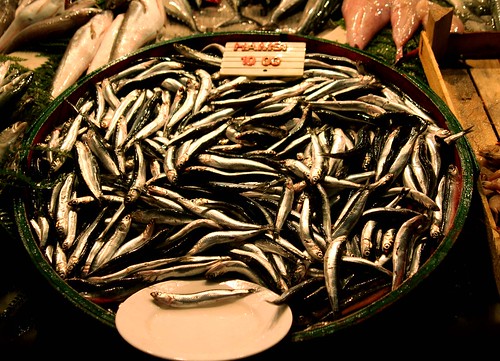
Thanks, guys, for selecting these silvery, slimy fish as photo of the day

Sunday, January 01, 2006
I DO Know How to Steal Elections
That's probably the most valuable skill I've picked up lately, so if you appreciate Carpetblogger's Bedraggled Santa photo, cruise over to Gridskipper's weekly photo contest and cast your vote.
It's not a bad site to explore, either.
It's not a bad site to explore, either.



